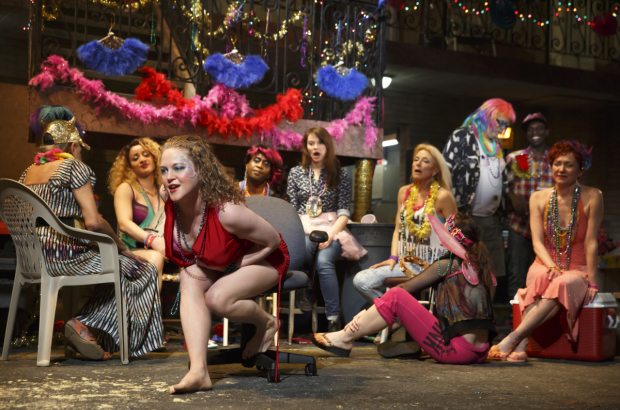Airline Highway

(© Joan Marcus)
"An example isn't the whole picture," says Tanya, a 62-year-old prostitute with a yen for Oxycontin. Played by the brilliantly talented Julie White, Tanya lives among a tribe of equally troubled misfits at the Hummingbird Motel, an ecosystem we find both desperately clinging to and unreservedly reveling in life off of New Orleans' Airline Highway. In a twist of irony, Lisa D'Amour's new play (which fittingly takes its name from this unglamorous thoroughfare) boldly attempts to capture the complexities of this world through the very slice-of-life methodology that Tanya advises against. Yet, even she would give a pass to D'Amour, who builds a living, breathing community of beautiful albeit damaged human beings on the stage of Manhattan Theatre Club's Friedman Theatre.
The Hummingbird's storied past, present, and future all revolve around Miss Ruby (Judith Roberts, who makes a moving second-act appearance). A former burlesque dancer and Bourbon Street club owner, Miss Ruby became the primary mother figure for dozens of lost souls in the City That Care Forgot. Now nearing the end of her life, Hummingbird residents plan to host a New Orleans-style living funeral in her honor. After all, "Why do we gotta wait until we're in the coffin for people to say nice things about us?" says the motel's eccentric poet Francis (a captivating Ken Marks). "Maybe if those people said those things earlier, we'd live longer," adds the motel manager Wayne (a lovably organic performance by Scott Jaeck).
These nuggets of wisdom are as familiar to D'Amour's unassuming characters as the bad choices that led them to their grungy digs on Airline Highway. Each member of the clan — which also includes a young stripper named Krista (an emotionally volatile Caroline Neff), a transgender bartender named Sissy Na Na (a standout performance by K. Todd Freeman), and a hustling handyman named Terry (played charmingly by Tim Edward Rhoze) — embodies his or her own unique collection of contradictions, shading in the human beings beneath their crude qualifiers.
Director Joe Mantello stunningly molds this collection of flawed individuals into the weatherworn family that D'Amour's nuanced script envisions. He designs a stage full of bustling activity and overlapping conversations with complete clarity and unforced camaraderie. At its core, the Hummingbird is a home of love, acceptance, and raw existence — qualities that draw us into an environment we would normally find grotesque. These are the same qualities that hypnotize Zoe (Carolyn Braver), the bookwormy 16-year-old stepdaughter of the former Hummingbird resident Bait Boy (Joe Tippett), who traded in the slums of New Orleans and his former flame (a thoroughly scorned Krista) for high living in suburban Atlanta with his wealthy older wife. Now going by plain old "Greg," he returns to his former stomping grounds to show Miss Ruby just what he's made of himself since his Hummingbird days. However, his Bait Boy identity slides right back on as the funeral, in proper New Orleans fashion, becomes a bacchanal of song, dance, drink, and general debauchery (prime fodder for costume designer David Zinn's raunchy imagination to run wild while set designer Scott Pask's rundown two-story motel is decked out to the nines in Christmas lights and feather boas).
Zoe, meanwhile, has a strictly academic mission. Her visit begins as research for a sociology paper about "subcultures," though quickly evolves (or devolves, depending on how you look at it) into a spiritual awakening, spurred on by the tribal rituals of Airline Highway's devoted natives. She pokes and prods at her hosts like microbes in a petri dish (Braver delivering a perfect combination of overconfidence and naïveté), until she finds she'd much rather join them in this subterranean culture than observe from afar.
In just one brief visit, Zoe experiences some of the highest highs and lowest lows the community has to offer — a troubling dichotomy D'Amour's play lays out with subtle power and elegance. As the maternal Tanya explains to the young girl, "You can repress everything and be miserable one way, or you can release yourself into the primal moment and be miserable in another." With no ideal in sight, it all comes down to the legacy you leave behind and the people who are there to remember it. The Hummingbird is no glorified utopia where life and love all come free, but it is a precious gem of primal energy in danger of being forgotten — though with Airline Highway to spread its infectious spirit across Broadway, attention will surely be paid.










